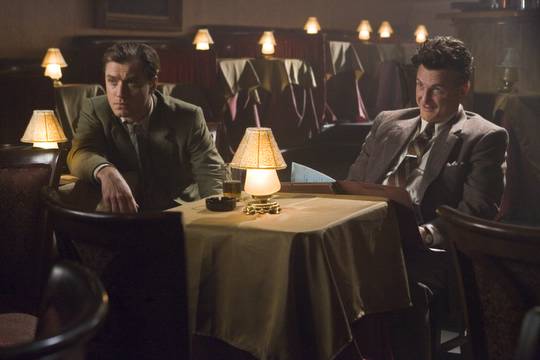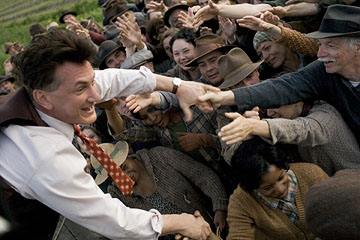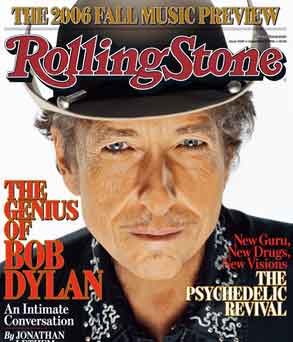By way of Ed Rants, Sci-Fi and executive producer George Clooney are collaborating on a 6-hour TV version of Neal Stephenson’s Diamond Age. Not the most approachable of Stephenson‘s books offhand, so I’ll be curious to see what they do with it.
Category: Authors
Hallows Be Thy Name.
Old news now, but it happened while on the track: Harry Potter’s final chapter gets a title: Harry Potter and the Deathly Hallows.
No Dubya Left Behind.
“But if the list is for real, it’s evidence of presidential dereliction of duty, and perhaps an outright threat to national security. Two books a week is an uphill battle for a graduate student whose responsibilities don’t even include showering. For a president, who lives at work, reading and comprehending two serious books a month takes a Herculean effort.” (Hey, I shower!…um, most days.) Slate‘s Bruce Reed discusses Dubya’s newfound love for books, suggesting that his recent reading contest with Karl Rove is part of the reason why things have gone so astray of late for this president. Well, call me old-fashioned, but — My Pet Goat notwithstanding — I’d usually rather see Dubya with his nose in a good book than see him make any more lousy world-threatening decisions. Besides. Dubya dug himself in this hole long before 2006…some healthy book learnin’ might’ve done him right earlier in his tenure. Hey, at the very least, he might’ve locked down that whole pesky Shia-Sunni thing.
Beast of Burden.

Unfortunately, the reviews of Stephen Zaillan’s All the King’s Men, the second half of my Friday morning double-feature, are basically correct. The film just doesn’t work…Indeed, it’s even a bit of a stinker. I’ve never seen the 1949 John Ireland/Broderick Crawford version, so I can’t tell you how it compares to that particular Oscar-winner. But, a few ghostly wisps of Penn Warren’s prose notwithstanding, this 2006 take on the novel is, as I feared in a post one year ago today, both hopelessly miscast and remarkably pedestrian. Straining mightily for solemnity throughout its run, this Men feels leaden from the start and fails to capture the sprawling grandeur of the novel (which, I guess, some literary critics hate. I for one love the book — it’s one of my all-time favorites, and not just for the failed historian digression.) If you’ve never read All the King’s Men, trust me — you’ll want to stay away from this flick. (If you have, well, you probably want to stay away too.)
Loosely based on the life of Louisiana’s Huey Long, All the King’s Men follows the trajectory of one Willie Stark (Sean Penn, way off), an earthy and ambitious backcountry politician with big city hungers and national dreams. (Consider him the Tommy Carcetti of his day.) In the midst of running a doomed gubernatorial campaign — designed by political insiders Tiny Duffy (James Gandolfini) and Sadie Burke (Patricia Clarkson) to split the hick vote and thus elect the favored candidate of the powers-that-be — Starr finds his populist voice and manages to capture the State House on a platform of less corporate graft and more roads, schools, and libraries for the people. But, once in office, the lure of power aggravates Stark’s more misanthropic tendencies, and (though this film barely explains how) the new governor begins to enact his redistributive policies with increasingly little regard for democratic niceties.
Along for the ride is our embittered narrator, Jack Burden (Jude Law, also way off but, surprisingly, closer to the mark than Penn). A slumming scion of Louisiana’s elite turned disaffected journalist (and functioning alcoholic), Burden, who relishes playing the world-weary observer, becomes Stark’s right-hand man despite himself. But, involvement, like, power, carries its own price. Soon, to accommodate Stark’s growing political appetites, Burden finds he must not only reenter but betray the past he thought he’d earlier burned away, whether it be by digging up dirt on his magisterial godfather, Judge Irwin (Anthony Hopkins, on autopilot), convincing his best friend (Mark Ruffalo, zombielike) to sign up under Stark’s employ, or allowing his youthful sweetheart (Kate Winslet, strangely bad) to herself come under Stark’s thrall.
To the film’s credit, the movie attempts to spend as much time on Burden’s arc as it does on Stark’s, as it should. But the two halves of the tale seem almost wholly separate here — Stark disappears for the middle third, when Burden’s backstory takes center stage. And that’s just the start of what’s wrong here — Simply put, everything just seems off. Penn is wholly unbelievable (and virtually inscrutable) as Stark, Law doesn’t serve much better as Burden. Other actors (Hopkins, Ruffalo) seem bored, others still (Gandolfini, Clarkson) are given too little to do. Accents are consistently mangled throughout. James Horner’s score is intrusive to say the least. Plot details are consistently elided over to the point of the story barely making sense (Why, for example, is Stark being impeached? One gets no clue in this version.) And Zaillan’s hamhanded directing stops the movie dead all too many times (the most egregious case being in the final moments, with the Louisiana seal — you’ll see what I mean.) Even the period is off: The novel takes place during the Depression, but for reasons that never become apparent we begin our tale here in 1954. If it ain’t broke, people…
The sole redeeming grace of this version of All the King’s Men are the occasional literary flourishes from the book, which are usually given by Jude Law in voiceover. Only in these brief moments, and only imperfectly, can we sense the endless jiggers of whiskey, the cedary scent of spanish moss, the lingering sweat and grinding despair that characterize Penn Warren’s novel. Whether it be Willie’s path to power or Jack’s remembrances, All the King’s Men is about more than just a political rise and fall. As befitting its author’s role in the southern agrarian literary movement, curdling at the novel’s heart is a lament for the days of yore and a futile raging against the inexorable indignities of time. The past passes: It marks us forever and can neither be escaped nor reclaimed as it was — it can only be confronted and accepted. “Man is conceived in sin and born in corruption and he passeth from the stink of the didie to the stench of the shroud.” Zaillan’s film version does make a meaningful attempt to capture these crucial elements of the book, but, alas, like Willie himself, its reach far exceeds its grasp.

Children of Men, Elves, and Dwarves.
By way of a former member of the program here, Christopher Tolkien announces that, after thirty years of work, he’s completed and is publishing an unfinished 1918 J.R.R. Tolkien manuscript entitled The Children of Hurin.
Pre-Modern Balladeer.
“What we do understand, if we’re listening, is that we’re three albums into a Dylan renaissance that’s sounding more and more like a period to put beside any in his work. If, beginning with Bringing It All Back Home, Dylan garbed his amphetamine visions in the gloriously grungy clothes of the electric blues and early rock & roll, the musical glories of these three records are grounded in a knowledge of the blues built from the inside out…Dylan offers us nourishment from the root cellar of American cultural life. For an amnesiac society, that’s arguably as mind-expanding an offering as anything in his Sixties work. And with each succeeding record, Dylan’s convergence with his muses grows more effortlessly natural.” In the new Rolling Stone and on the eve of Modern Times (due out this Tuesday), author Jonathan Lethem interviews Bob Dylan. (Via Ed Rants.)
Killing an Arab?
He can turn and walk away or he can fire the gun…Having eluded the press and apparently entering his existential period, Dubya totes around Camus’s The Stranger in Crawford. Update: Slate‘s John Dickerson has more.
Terry Does Dick | Prison Break.
Speaking of Philip K. Dick, word on the street is the one and only Terry Gilliam will be heading The Owl in Daylight, a biopic of the author set to star Paul Giamatti in the lead. And, speaking of paranoid sci-fi-ish surveillance thrillers, Christopher Nolan looks set to board The Prisoner, as in a film version of the classic BBC series, after he finishes the Dark Knight.
That Giant Sucking Sound.
“Granted, some things require more involved assessments (like, say, James Joyce: I find his early work unparalleled in its style and its evocation of emotion, while his later writing became willfully opaque in a manner that leaves me cold). But other things don’t require this sort of elaboration (like, say, John Grisham: He sucks).” In Slate, my friend Seth Stevenson writes in defense of the word “suck.”
He is Legend.
“When you thought it had to be over, that your nerves couldn’t stand any more, that was when Matheson turned on the afterburners. He wouldn’t quit. He was relentless. The baroque intonations of Lovecraft, the perfervid prose of the pulps, the sexual innuendoes, were all absent. You were faced with so much pure drive that only rereadings showed Matheson’s wit, cleverness, and control.” By way of Ed Rants, Stephen King pays tribute to Richard Matheson’s I am Legend, soon to be a Will Smith/Johnny Depp movie near you.

